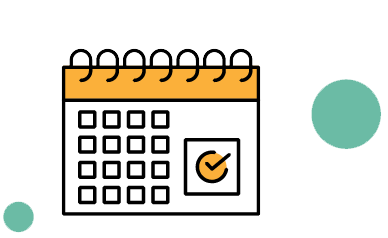HOW IT
WORKS
It is important for every District resident to participate in the 2020 US Census—this includes people of all ages and races, as well as citizens and non-citizens.

January 21, 2020
The 2020 US Census count begins in Alaska.

March 2020
Letters will be sent to most households. These letters include instructions on how to participate in the 2020 US Census.
- March 12-20, 2020 – You will receive an invitation to respond online to the 2020 US Census.
- March 16-24, 2020 – You will receive a reminder letter to respond to the 2020 US Census.
- March 26-April 3, 2020 – If you haven’t responded yet, you will receive a reminder postcard.
April 1, 2020
You can respond to the Census today. Respond on the official U.S. Census Bureau website now.
Census Day!
Census Day is a nationwide push to encourage everyone to complete the Census. If you’ve already completed the Census, use this day to encourage your neighbors, friends and family to complete the 2020 US Census.
- April 3-8, 2020 – If you haven’t responded yet, you will receive a reminder letter and paper questionnaire.
- April 20-27, 2020 – If you haven’t responded yet, this will be the final reminder postcard before the U.S. Census will follow up with you in person.

May 2020
If you haven’t taken the 2020 US Census, Census Bureau employees will follow up in person to ensure that your household fills out the census.

December 2020
The Census Bureau delivers the final count to the president. This data is used to divide seats in Congress according to the population of all 50 states.
How to Complete the Census
Step 1:
Understand How the Census Impacts You
Before participating in the census, take time to understand how it impacts you and your community. The census helps DC agencies and businesses make important decisions that impact all DC residents. Read more about how the census impacts education, healthcare, housing, childcare and transportation.
Step 2:
Know What to Expect
The 2020 US Census will ask questions about the following:
- How many people are living or staying at your home on April 1, 2020
- Whether your home is owned or rented
- The age, race, sex of each person in the household
- Whether a person in the household is of Hispanic, Latino or Spanish origin
- Relationships of each person in the household to one central person (usually the person completing the form for the household)
The 2020 US Census will NEVER ask for your social security information or other personal information like your bank account numbers or political information.
Step 3:
Mark Your Calendar
Around mid-March, you should receive a letter with directions for taking the 2020 US Census. Mark your calendar to complete the Census by or on April 1.
Step 4:
Take the Census
The “self-response” phase of the 2020 US Census will begin in mid-March. You will have three ways to respond to the census:
- Online
- By phone
- By mail
Census by mail is only available in English and Spanish.
The census by phone or online allows for responses in Spanish, Arabic, Chinese, French, Haitian Creole, Japanese, Korean, Polish, Portuguese, Russian, Tagalog, and Vietnamese. There are also video and printed guides available in 59 languages.
The goal is for as many households as possible to complete their census in March or April. After May 30, households that have not completed the census form will receive a follow-up visit from a US Census taker at their home.
FAQ's
Will my identity be protected if I take the census?
Your personally identifiable information is protected by law and cannot be shared outside of the Census Bureau. Data security is the highest priority for the Census Bureau, and extensive protections are in place to protect the integrity of the 2020 US Census.
- US Census will never share a respondent’s personal information with other government agencies
- Results from the census are reported in statistical summary format only
- Records are confidential for 72 years by law (Title 44, U.S. Code)
- All Census Bureau employees swear a lifetime oath to protect respondent information. Penalty for wrongful disclosure is up to 5 years imprisonment and/or a fine of $250,000
Read about data security in Spanish.
Who should I include in the census count for my household?
Your household is defined as anyone who is living in your home on April 1, 2020. You should be counted as part of the household where you sleep or live the majority of the time. There are special circumstances for students, military personnel, people in shelters, visitors or people in health care facilities. If you fit into one of these categories read more about how to correctly participate in the census.
Should children be counted in the census?
Yes, count all children who are living in your household, including grandchildren, nieces and nephews, or children of friends. It’s important to include newborns.
Am I required to take the census?
Yes, you are required by law to be counted in the 2020 US Census if you are living in Washington, DC.
How does an undercount impact disadvantaged communities?
DC residents east of the river, seniors and immigrants were historically undercounted during the 2010 Census. The census helps DC agencies allocate funds to important programs for residents of the District. Having an accurate count ensures that resources are appropriately allocated to these groups.


